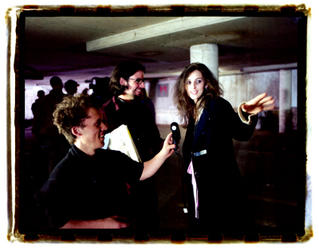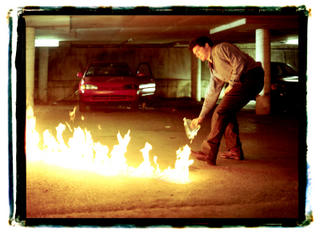Living-Room War
Thoughts, musings, behind the scenes, works in process, and with a little luck, a chronicle of the making of writer/director Doug Karr’s first feature film from development to distribution...
Monday, July 25, 2005
Critique-Must-Be-Scathing-to-Be-Good
My friend and mentor Barry Boyce gave me some great insight into critique after reading my recent posts, so I thought I'd share it here:
"After reading about the notes process, I'm sorry I didn't kick your ass harder, but dude I liked it. What can I say? Also, I don't necessarily subscribe to the critique-must-be-scathing-to-be-good school. Ain't nobody who knows FOR SURE whether something is good or not artistically. It's not auto mechanics. My writing teacher taught me that the best thing you can do for someone is to be encouraging. You tell them what you think works first and then what doesn't work FOR YOU, by contrast. Then, they must find their way. That's how art works with critique. The kind of notes process where a bunch of little experts rip and tear and tweak and futz with something that is an integrated piece of work is just what [you should be] running from. As soon as you detect that somebody knows better than you what your artwork is about, that's the signal to keep your own counsel. You will never ever at any stage whatsoever receive confirmation. Thank god for that. Certainty is death."
- Barry
Thursday, July 21, 2005
The Eighth Circle of Hell
"Have you been to the multiplex lately? Have you even merely scanned the offerings found there? ...The movie theater has become the eighth circle of hell. Nothing more than a trough really... Sitting between the massive cupholders in the cineplex is a Clockwork-Orange-like treatment, akin to having cotton candy force fed into your frontal cortex."
- Barry Boyce, The Ottawa Citizen, 2005
Wednesday, July 20, 2005
Rocks Being Dropped on My Head
Diamonds form in the molten rock of the Earth's mantle over millions of years, but it only took me five days to realize that the rocks being dropped on my head were precious. After compiling the overwhelming readers notes into a single document fit for consumption by the Harold Greenburg Fund Board of Directors, I began to realize that with or without a development grant, I had been given some incredibly useful insights into my script. One of my worst fears as a filmmaker is of writing a script that's formulaic. To my mind the last decade has been a progressive downward spiral for Western filmmaking and much of that can be attributed to structural conventions at the script stage. It feels like it's time for another maverick renaissance like the kind inflicted on Hollywood in the 1970s by young nonconformist filmmakers. But in order to contribute to that wave, I know that I've got to re-invent convention and find new ways of telling fresh stories. But here's the thing—a confusing plot that doesn't tie together is not the sign of an innovative writer but a lazy one. Reworking the script notes into a re-write plan gave me insight into how I might make some of these crucial changes. So now I feel like I have the tools to begin to fix Living-Room War on a structural level, hopefully without falling into formula. And that's really exiting.
Tuesday, July 05, 2005
Notes -AKA- You asked for it
Reader's Notes are a funny thing. On the one hand it's clear that working in a vacuum is a dangerous way to write, but putting your work in someone else's hands is a frightening alternative. Upon completing the last draft I made a decision to print up twenty copies of the 120 page script and distribute them amongst my friends and colleagues, asking each reader to provide me with a set of notes. It seemed like the right move to make. At a certain point it becomes difficult to kick one's own ass—how can you make something better if all you see is the good elements. However, I had felt that after all this effort I was nearing the peak of a mountain, and now suddenly I fear that I'm only a few steps from the base-camp.
The main difficulty is who can you trust? One reader's favorite scene is another's most hated. Reader A feels like the drama is too flat, while Reader B feels it's overstated. My girlfriend Sierra tells me that "I love it," with no comments following is a bad set of notes, but at this point that's all I really want to hear. One of my associates, a fellow writer, unabashedly admitted the he dislikes the route I've taken with the script, but part of me is tempted to take that as a compliment. My mom's notes where pretty helpful, even though she found the screenplay too crude and violent (going back over the first few scenes today I suddenly felt a little embarrassed at just how rude some of my characters had acted in front of my mother). It's all just kind of overwhelming. I wish I could just process the notes quickly, not take it too personally and then climb back into my vacuum to do another re-write, but I've got a development grant due on Thursday and I need to really decipher who's on the money and who's way off base. I guess it's better to be dealing with this now, rather than at the first screening—although from experience I’d put money on the fact that I'll be receiving a little feedback at that point too.










